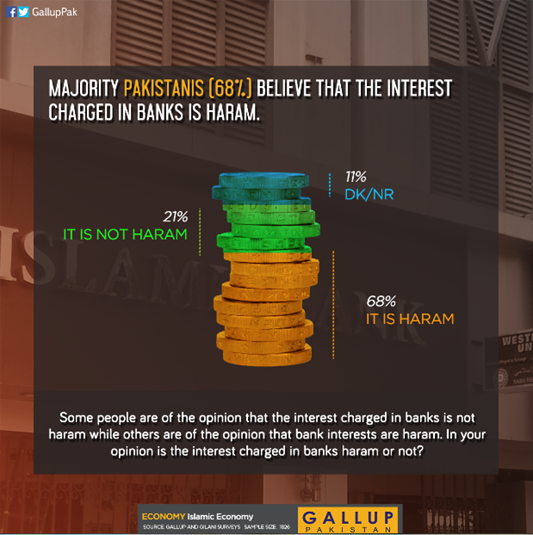2 in 3 Pakistanis Believe that Bank Interest is Haram: Survey
2 in 3 Pakistanis Believe that Bank Interest is Haram: Survey
According to a Gilani Research Foundation Survey carried out by Gallup Pakistan, 68% Pakistanis believe that interest charged by banks is haram.
The results shouldn’t come as a surprise to most of us, and points to one of the major issues why Pakistanis generally shy away from banking products.
Details about The Gallup Survey Report
According to Gallup Pakistan, this is how the survey was formulated and presented:
‘A nationally representative sample of men and women from across the four provinces was asked, “Some people are of the opinion that the interest charged in banks is not haram while others are of the opinion that bank interests are haram. In your opinion is the interest charged in banks haram or not?” In response, 68% said that it is haram while 21% said that it is not haram and 11% did not respond.’

The study was released by Gilani Research Foundation (who also did the field work for the poll) and carried out by Gallup Pakistan, the Pakistani affiliate of Gallup International. The recent survey was carried out among a sample of 1826 men and women in rural and urban areas of all four provinces of the country, during December 21 – December 28, 2015. The error margin is estimated to be approximately ± 2-3 per cent at 95% confidence level.
Concluding Thoughts
These findings are instrumental for social scientists and policy makers in Pakistan to determine the economic trajectory of Pakistani communities in the years ahead.
Another reason why Pakistanis shun normal banking channels has to do with the nascent (and mighty convoluted) tax culture in Pakistan as well as the cultural and religious moorings that are firmly entrenched.
In light of Queen Maxima and World Bank President’s visit, these findings show that Pakistan has a lot of ground to cover when it comes to making the Pakistani populace financially inclusive.
After all, 100 million Pakistanis are still without basic financial services, but the growth of digital channels such as EasyPaisa can usher in a revolution in the coming years, if it hasn’t already.
